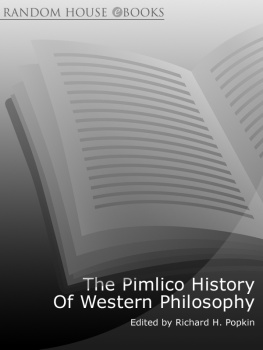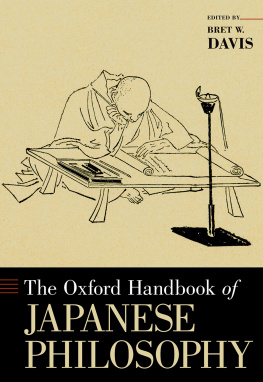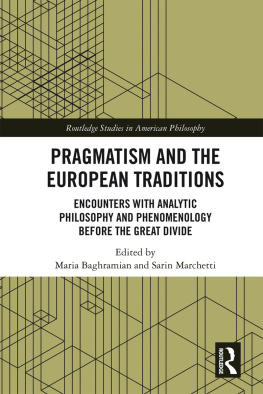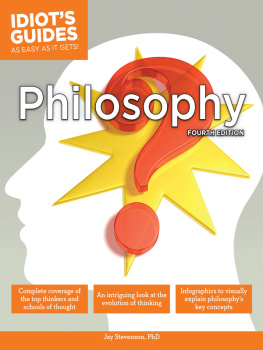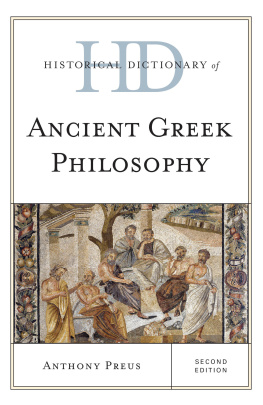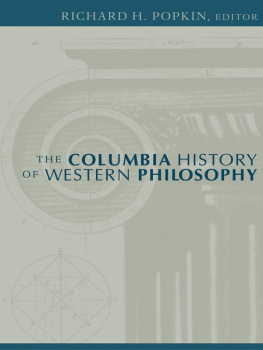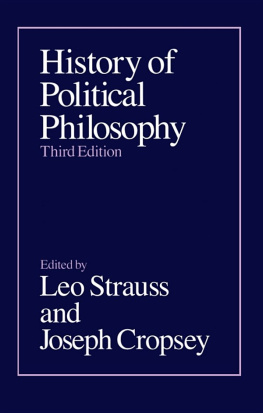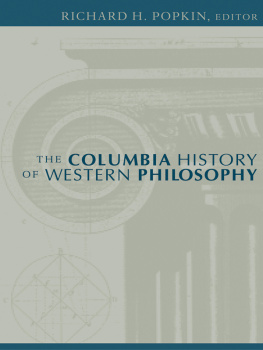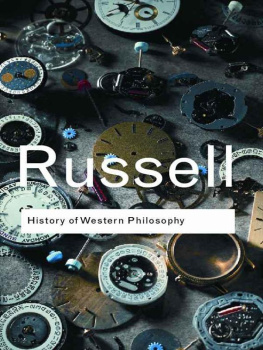PIMLICO
THE PIMLICO HISTORY OF
WESTERN PHILOSOPHY
Richard H. Popkin is professor emeritus, Washington University, St. Louis, and adjunct professor of philosophy and history at UCLA. He is founding director of the International Archives of the History of Ideas, and president emeritus and founding editor of the Journal of the History of Philosophy. Among his many books are The Third Force in Seventeenth-Century Thought; The History of Skepticism from Erasmus to Spinoza; Introduction to Philosophy (with Avrum Stroll); and The High Road to Pyrrhonism.
About the Book
From Plato to Wittgenstein and from Aquinas to Heidegger, the volume provides lively, in-depth and up-to-date historical analysis of all the key figures, schools and movements of Western philosophy. Richard Popkin has assembled 63 leading scholars to forge a highly approachable chronological account of the development of Western philosophical traditions.
The Pimlico History significantly broadens the scope of Western philosophy to reveal the influence of Middle Eastern and Asian thought, the vital contributions of Jewish and Islamic philosophers, and the role of women within the tradition. Popkin also emphasizes schools and developments that have traditionally been overlooked. Sections on Plato and Aristotle are followed by a detailed presentation on Hellenistic philosophy and its influence on the modern developments of materialism and scepticism. Another chapter considers Renaissance philosophy and its seminal influence on modern humanism and science. Turning to the modern era, the contributors give equal attention to both sides of the current rift in philosophy between continental and analytic schools, charting the development of each right to the end of the twentieth century.
Each chapter includes an introductory essay, and Popkin provides notes that draw connections among the separate articles. The rich bibliographic information and the indexes of names and terms make the volume a valuable resource. Combining a broad scope and penetrating analysis with a keen sense of what is relevant for the modern reader, the book provides an accessible intro for students and general readers.
Acknowledgments
I should like to take this opportunity to thank those who have aided me in the preparation of this volume.
First of all, I should like to thank Robert John Arias, a former student of mine, who did much of the initial work looking over the contributions and getting them organized in a common computer program. He gave me much valuable advice in putting the entire volume together.
Next, I owe much gratitude to four research assistants of the Seventeenth and Eighteenth Century Center at UCLA, Kimberley Garmoe, Russell Ives Court, Anna Suranyi, and Tim Corrall, who most ably aided me in finishing the volume, editing manuscripts, doing library research, and many other tasks.
Then, I should like to take this opportunity to thank Franz Peter Hugdahl of Columbia University Press, with whom I have been in almost constant communication. We have worked out many critical problems together, and he has worked valiantly to finally bring the volume to publication.
Thanks are also due to Keith Frome, formerly of Columbia University Press, who first suggested to me that I undertake the task of organizing a new one-volume history of Western philosophy, and to James Raimes of the Research Publishing Division of Columbia University Press, who supervised the venture at the publishers end and who has always been most helpful in assisting me in overcoming various problems and difficulties.
In addition, I should like to thank all of the contributors for their excellent work and for jointly making this a volume that we all can be proud of.
Finally, I would like to express my personal feeling of satisfaction that it was my alma mater, Columbia University, that proposed this project to me. Columbias philosophy department has been in the forefront of those encourging the serious scholarly study of the history of philosophy throughout this century, even while it was being abandoned in many other intellectual centers. It was at Columbia, as both an undergraduate and graduate student, that I was able to study the history of philosophy with distinguished professors including John Herman Randall and Herbert W. Schneider, who later encouraged me in my researches over the last half century. I owe special thanks to Paul Oskar Kristeller who taught me and encouraged me and who also examined my plan for this volume and made several significant suggestions.
1
Origins of Western Philosophic Thinking
INTRODUCTION
Philosophy is the attempt to give an account of what is true and what is important, based on a rational assessment of evidence and arguments rather than myth, tradition, bald assertion, oracular utterances, local custom, or mere prejudice. As with many of the arts and sciences that make up Western civilization and culture, philosophy was first defined as such by the Greeks around the fifth century B.C.E . However, evidence suggests that many of the problems, concepts, and approaches that became known as philosophy in Greece originated in other places and times. Of these sources, three are particularly notable: Asian or oriental (including Phoenician, Assyrian, Hittite, and Iranian influences); Hebrew (or biblical); and Egyptian.
The literary remains of oriental, Egyptian, and Hebrew culturesworks such as Gilgamesh, Kumarbi, The Song of Villikummi, Enuma Elish (the Babylonian story of creation), and the Hebrew Bibledisplay a fusion of what we call science, philosophy, and religion, though it is usually referred to as mythology. Mythology is, in part, a primitive attempt to understand the world. In general, mythopoeic (myth-making) thought has a different logical, imaginative, and emotional character than the kind of speculative thought that has come to characterize philosophy.
In these ancient works, for example, time and space are qualitative and concrete rather than quantitative and abstract, as they are generally considered today. Nevertheless, such religious myths show a concern for the origins and ends of things. They also see the visible order of the world as embedded in an invisible one that is maintained by human customs and institutions. This concept, despite its mythological source, motivated the more distinctly logical, rational, and speculative thought of the earliest Greek philosophers. Moreover, rather dramatic mythopoeic conceptions of naturestrife between the divine and demonic; the chaotic and cosmic aspects of the mythspersist in the writings of various pre-Socratics and in Platos Timaeus.
Oriental and Egyptian thought came to influence early philosophy by way of widespread Greek commerce throughout the Mediterranean. The public workers, mentioned by Homer in the Odyssey, for instance, who migrated into the Greek world, brought with them crafts, images, and cult practices, along with ideas about the gods, the cosmos, and the origins of human beings. The spread of these ideas was helped by a shared Indo-European language base.
Asian Sources and Influences
To many nineteenth-century European scholars, Asian origins of Greek thought were inconceivable. We know now, however, that the Greek alphabet and system of writing came from Phoenicia (present-day Syria and Lebanon). Archives with documents preserved on clay tablets and even libraries of literary texts were inherited from the Babylonians and the Sumerians. The importance of written language, books, and libraries for the development of Greek thought cannot be overestimated. The Greek language has also incorporated many words that are derived from various other Indo-European languages.
Next page
